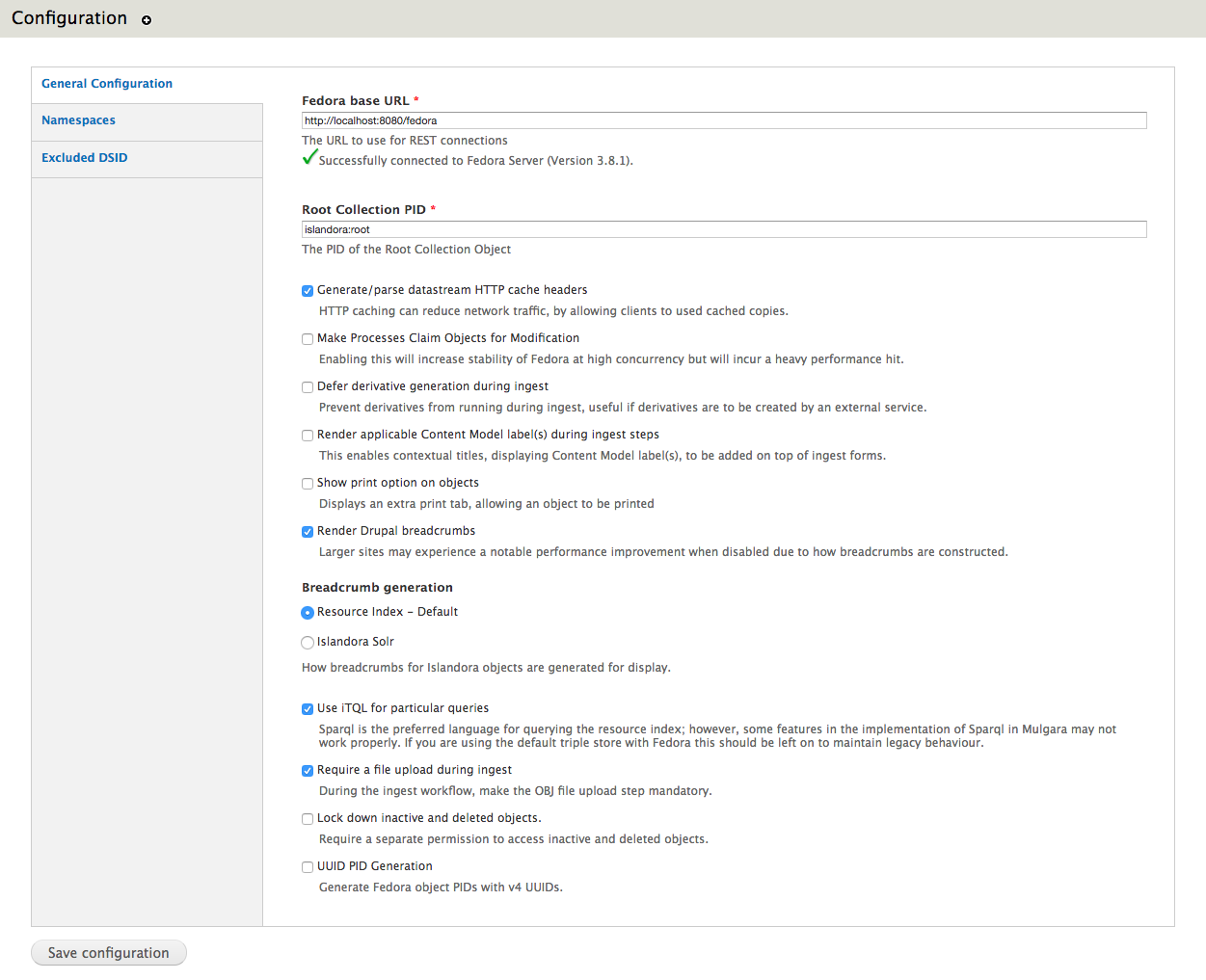7.5 KiB
Islandora 
Introduction
This module includes the core functionality for interacting with Fedora Repository objects through the Drupal interface.
For installation and customization instructions please see the documentation and the DuraSpace Wiki.
All bugs, feature requests and improvement suggestions are tracked at the DuraSpace JIRA.
Requirements
This module requires the following modules/libraries:
Tuque is expected to be in one of two paths:
- sites/all/libraries/tuque (libraries directory may need to be created)
- islandora_folder/libraries/tuque
More detailed requirements are outlined in the Installing the Islandora Essential Modules chapter of the documentation.
Optional Requirements
If you want to support languages other than English, download and enable String Translation, and follow our guide for setting up additional languages.
Installation
This is one Drupal module in a suite of modules (and stack of related software) which are required for Islandora to function correctly. For full installation instructions please see the documentation in the DuraSpace Wiki.
Global Fedora XACML policies
Before installing Islandora, the XACML policies located here should be copied into the Fedora global XACML policies folder. This will allow "authenticated users" in Drupal to access Fedora API-M functions (create, edit, and delete objects in Fedora).
Notes:
- Delete the
permit-upload-to-anonymous-user.xmlandpermit-apim-to-anonymous-user.xmlpolicies unless you want to allow anonymous (unauthenticated) users to create Islandora objects (not recommended). - Delete the
deny-purge-datastream-if-active-or-inactive.xmlto allow users to purge (permanently remove) datastream versions.
More detailed information can be found in the 'Set XACML Policies' in the Installing Fedora chapter of the documentation.
Protecting the 'anonymous' username
The islandora_drupal_filter passes the username of 'anonymous' through to Fedora for unauthenticated Drupal Users. A user with the name of 'anonymous' may have XACML policies applied to them that are meant to be applied to Drupal users that are not logged in or vice-versa. This is a potential security issue that can be plugged by creating a user named 'anonymous' and restricting access to the account. If this is done after installing Islandora, Drupal's cron can be run to remove expired authentication tokens.
Configuration
Configuration that applies to all solution packs, including the location of the Fedora Repository, the namespaces accessible by this instance of Islandora, and whether to generate derivatives on ingest, are available at admin/islandora/configure.
Breadcrumb Generation
Whether Drupal breadcrumbs (showing an object's parent hierarchy) should be displayed, and how they are generated, can be set on the configuration page. Other modules (such as Islandora Solr) may provide alternatives that perform better at large scales than the built-in Resource Index query.
Inactive and Deleted Objects
By default, objects with the Fedora state of "Inactive" or "Deleted" are accessible to all users with the Drupal permission "View repository objects". It is possible to use a separate permission to control access to these non-"Active" objects, but this permission must first be enabled at admin/islandora/configure, then the permssion can be granted to desired roles at admin/people/permissions.
Customization
- Hooks provided by Islandora are documented in
islandora.api.php. - A detailed tutorial on extending the multi-page ingest forms is available on the Github (developers') Wiki.
- Additional modules developed by members of the Islandora community to extend Islandora can be found on the curated Islandora Awesome list.
Image Server configuration
Drupal
In Administration » Islandora » Image Server configuration
Choose the type of image server (Djatoka or IIIF).
Set the URL.
Djatoka
IIIF
If using IIIF choose to send token as a header and choose the token to use.
Any IIIF image server can be used with the IIIF tile source. The IIIF tile source provides a templated identifier which the IIIF server must be configured to resolve. This could be the full URL to the datastream to be displayed or something more complex.
The Cantaloupe 🍈 IIIF image server can be configured to resolve these identifiers using the HttpResolver with no prefix specified.
Apache Reverse Proxy
Reverse proxy config: We make the assumption that we (reverse) proxy Djatoka, to fix the same-origin issue.
For Apache, with Drupal running on the same box as Apache, a couple lines like:
ProxyPass /adore-djatoka http://localhost:8080/adore-djatoka
ProxyPassReverse /adore-djatoka http://localhost:8080/adore-djatoka
in the Apache config somewhere (either the main apache.conf, httpd.conf, or in and arbitrarily named *.conf in your Apache's conf.d directory should suffice to establish the reverse proxy.
In Debian derived systems one will need to create location entries for each proxy or remove the Deny from All in mod_proxy's conf file.
Documentation
Further documentation for this module is available at our documentation wiki.
Troubleshooting/Issues
Having problems or solved a problem? Check out the Islandora google groups for a solution.
Maintainers/Sponsors
Current maintainers:
Development
If you would like to contribute to this module, please check out CONTRIBUTING.md. In addition, we have helpful Documentation for Developers info, as well as our Developers section on the Islandora.ca site.


